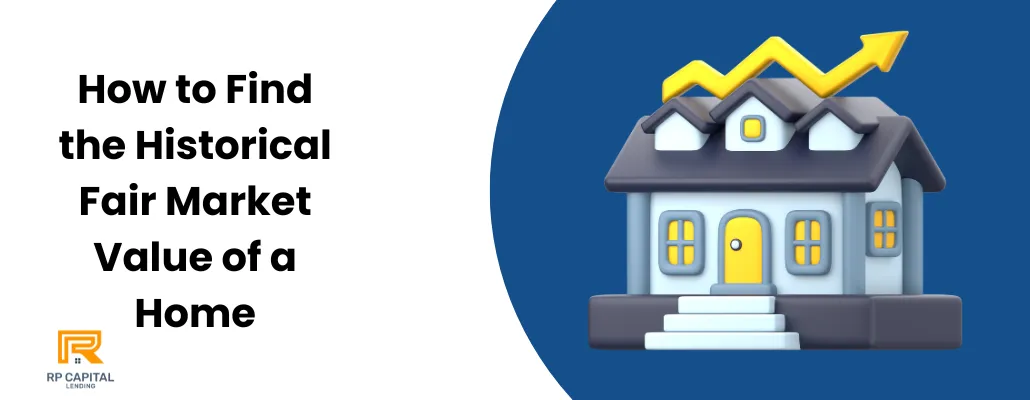Blog

How to Find the Historical Fair Market Value of a Home
Determining the historical fair market value of a home is a crucial step for homeowners, real estate professionals, and investors. This value reflects the price a property would have sold for in a competitive and open market at a specific point in time. Whether you're considering selling, buying, or assessing your property's historical worth, this article will guide you through the process.
Understanding Fair Market Value
Fair market value is the estimated price at which a property would change hands between a willing buyer and seller when both have reasonable knowledge of the relevant facts and neither is under any compulsion to buy or sell. It's a dynamic value that can change over time, making it essential to find its historical records.
Importance of Historical Fair Market Value
Knowing the historical fair market value of a property provides insights into its growth and value appreciation. This knowledge can be valuable for tax assessments, insurance purposes, or simply understanding the property's financial history.
Steps to Find Historical Fair Market Value
4.1 Research Local Government Records
Local government records often contain valuable information about property transactions, including historical sales data. Municipal archives, property tax records, and historical records are excellent starting points.
4.2 Utilize Online Real Estate Databases
Online real estate databases like Zillow, Redfin, and Realtor.com provide historical sale prices. These platforms compile data from various sources, making it easier to find historical fair market values.
4.3 Consult with Real Estate Appraisers
Real estate appraisers can help determine historical fair market values by considering property features, location, and market trends. Their expertise ensures accurate estimates.
Comparative Market Analysis (CMA)
Real estate professionals often use Comparative Market Analysis to assess a property's historical value. A CMA evaluates recently sold properties with similar features in the same neighborhood.
The Role of Real Estate Agents
Experienced real estate agents have access to databases and local knowledge, making them valuable resources for historical fair market value information.
Historical Price Trends
7.1 Analyzing Home Sales Data
Studying past home sales data helps identify patterns and trends that affect historical fair market values.
7.2 Identifying Property Improvements
Changes and improvements to a property can significantly impact its historical value. Identifying these improvements is crucial.
Factors Influencing Historical Fair Market Value
Various factors, including location, property condition, and market demand, influence historical fair market value. Understanding these factors is essential for accurate assessments.
Economic Conditions and Their Impact
Economic conditions, such as recessions or booms, can affect property values. Consider the broader economic context when estimating historical values.
Maintaining Historical Property Records
Keeping detailed records of a property's history, including renovations and repairs, can aid in determining historical fair market values.
Challenges and Pitfalls in Estimating Historical Fair Market Value
Estimating historical fair market value may be challenging due to data gaps, changing market dynamics, or property-specific issues. Recognizing these challenges is important for accurate assessments.
Legal Regulations and Property History
Understanding local legal regulations and property history, such as zoning changes or land disputes, is crucial for comprehensive assessments.
Benefits of Accurate Historical Fair Market Value
Accurate historical fair market value estimates empower homeowners to make informed decisions about their properties. It aids in selling or buying at the right price, managing taxes, and assessing investment opportunities.
Conclusion
Finding the historical fair market value of a home is essential for various real estate-related purposes. Utilizing local government records, online databases, real estate professionals, and historical data analysis can provide valuable insights. Accurate historical fair market value assessments are vital for making informed decisions in the real estate market.
Frequently Asked Questions (FAQs)
1. What is fair market value, and why is it important for homeowners?
Fair market value is the estimated price a property would sell for in an open market. It's important for homeowners to understand their property's worth for various financial and decision-making purposes.
2. How can I access historical fair market value data for my property?
You can access historical fair market value data through local government records, online real estate databases, or by consulting with real estate appraisers.
3. Why is it essential to consider property improvements when estimating historical fair market value?
Property improvements can significantly affect a property's value over time. Recognizing these improvements helps provide more accurate historical value estimates.
4. What challenges can I face when estimating historical fair market value?
Challenges may include incomplete data, changing market dynamics, and property-specific issues. It's essential to be aware of these challenges for accurate assessments.
5. How can accurate historical fair market value estimates benefit real estate investors?
Accurate estimates empower investors to make well-informed decisions, assess potential returns, and identify profitable investment opportunities.
RP Capital Lending is a d.b.a of RP Capital Partners Inc (NMLS # 2469193) | Privacy Policy
Copyright © 2022. All Rights Reserved.
Disclaimer: Loans only apply to non-owner occupied properties. Rates, terms and conditions offered only to qualified borrowers, may vary upon loan product, deal structure, other applicable considerations, and are subject to change at any time without notice.

